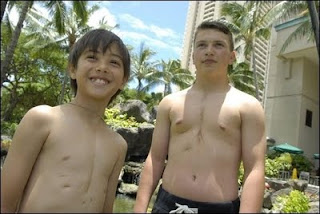
Less than six months after Julie Passos gave birth, she was flying with her infant son, Keegan, to San Diego for her baby's open-heart surgery.
No parent should have to go through that, she said. And no parent should have to go through it alone.
"We didn't know what to expect," Passos said.
But when they arrived in California at Rady Children's Hospital, they met another family from Hawai'i, also there to receive treatment for their child.
"They told us about this group, Kardiac Kids. Before that, we felt like we were all alone," she said.
Kardiac Kids, a Honolulu support group for parents and children dealing with congenital or acquired heart defects, gathered yesterday at the Japanese Cultural Center for its annual Valentine's Day party. About 50 families participated.
The support group is hosted by Kapi'olani Medical Center For Women & Children, which has performed heart operations on children in Hawai'i. The group meets every second Tuesday of the month in the Kapi'olani Medical Center cafeteria, where they share experiences, answer questions and plan outreach activities.
Passos' son Keegan, now 10, has undergone three open-heart surgeries, a dozen catheterizations and has a pacemaker.
At school, Keegan often feels different because he can't participate in sports or physically strenuous activities, Passos said. But Kardiac Kids is his safe haven.
"The kids have a bond that you can't put into words," Passos said.
Some of the Kardiac Kids participate in a dance group called the "Mini Heartbeats." Leading up to yesterday's party, the children were meeting three times a week to practice their moves.
"He has a place where he feels normal," Passos said.
It is estimated that 1 percent of children in Hawai'i will be born with a heart defect, according to the Pediatric Cardiac Program at Kapi'olani, the only such program in the state.
Laura Bonilla, executive director of Pediatrics at Kapi'olani, said families 10 years ago would have to fly to the Mainland for access to medical specialists to perform pediatric heart conditions. Now, Kapi'olani offers advanced pediatric heart procedures, from open heart to minimally invasive techniques.
Also, five times a year, Kapi'olani Medical Center brings in leading pediatric heart specialists from the Mainland.
"So many of these children can remain at home and have these critical procedures done here," she said.
Another mom, Tina Chan, said the group helps parents cope.
When Chan was pregnant with her son, Nathan, she learned that he would be born with a heart defect. Still pregnant, she stumbled across the Kardiac Kids support group while on a Valentine's Day date at the Waikiki Aquarium. The group was there holding its annual party.
"When you find out your child has a heart condition, you want someone who knows what is happening, who has experienced it," Chan said.
Nathan, now 8, has undergone four open-heart surgeries to correct a hypoplastic left heart.
"He basically has half a heart," she said.
For Chan, the group has become an extension of her family.
"We want others to know that they are not alone. For me, this is mostly about the emotional support," she said.
http://the.honoluluadvertiser.com/article/2008/Feb/19/ln/hawaii802190328.html






.jpg)




